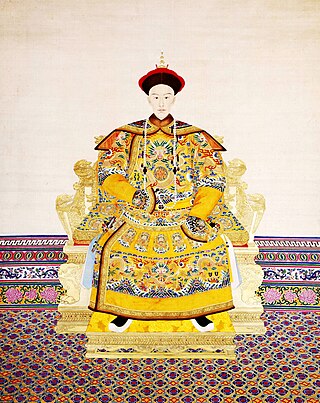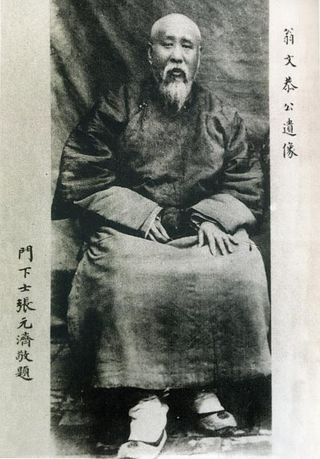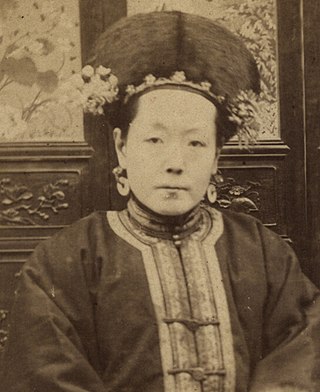This article relies largely or entirely on a single source .(March 2019) |
| |||||
| Decades: | |||||
|---|---|---|---|---|---|
| See also: | Other events of 1871 History of China • Timeline • Years | ||||
Events from the year 1871 in China.
This article relies largely or entirely on a single source .(March 2019) |
| |||||
| Decades: | |||||
|---|---|---|---|---|---|
| See also: | Other events of 1871 History of China • Timeline • Years | ||||
Events from the year 1871 in China.

Empress Dowager Cixi ; born Yehe Nara Xingzhen, was a Chinese noblewoman of the Manchu Yehe Nara clan, concubine and later regent who effectively controlled the Chinese government in the late Qing dynasty for almost 50 years, from 1861 until her death in 1908. Selected as a concubine of the Xianfeng Emperor in her adolescence, she gave birth to a son, Zaichun, in 1856. After the Xianfeng Emperor's death in 1861, the young boy became the Tongzhi Emperor, and she assumed the role of co-empress dowager, alongside the Emperor's widow, Empress Dowager Ci'an. Cixi ousted a group of regents appointed by the late emperor and assumed the regency along with Ci'an, who later died. Cixi then consolidated control over the dynasty when she installed her nephew as the Guangxu Emperor at the death of her son, the Tongzhi Emperor, in 1875. This was contrary to the traditional rules of succession of the Qing dynasty that had ruled China since 1644.

The Guangxu Emperor, temple name Emperor Dezong of Qing, personal name Aisin-Gioro Zaitian, was the tenth Emperor of the Qing dynasty, and the ninth Qing emperor to rule over China proper. His reign lasted from 1875 to 1908, but in practice he ruled, without his aunt Empress Dowager Cixi's influence, only from 1889 to 1898. He initiated the Hundred Days' Reform, but was abruptly stopped when the empress dowager launched a coup in 1898, after which he became powerless and was held under house arrest until his death by poisoning. His era name, 光緒; 'Guangxu', means "glorious succession".

The Tongzhi Emperor, temple name Emperor Muzong of Qing, born Aisin-Gioro Zaichun, was the ninth Emperor of the Qing dynasty, and the eighth Qing emperor to rule over China proper. His reign, from 1861 to 1875, which effectively lasted through his adolescence, was largely overshadowed by the rule of his mother, Empress Dowager Cixi. Although he had little influence over state affairs, the events of his reign gave rise to what historians call the "Tongzhi Restoration", an unsuccessful modernization program.

Empress Xiaozhenxian, of the Manchu Bordered Yellow Banner Niohuru clan, was a posthumous name bestowed to the wife and empress consort of Yizhu, the Xianfeng Emperor. She was empress consort of Qing from 1852 until her husband's death in 1861, after which she was honoured as Empress Dowager Ci'an.

Yixuan, formally known as Prince Chun, was an imperial prince of the House of Aisin-Gioro and a statesman of the Manchu-led Qing dynasty in China. He was the father of the Guangxu Emperor, and the paternal grandfather of Puyi through his fifth son Zaifeng.
Yehe Nara Jingfen, of the Manchu Bordered Yellow Banner Yehe Nara clan, was the wife and empress consort of Zaitian, the Guangxu Emperor. She was empress consort of Qing from 1889 until her husband's death in 1908, after which she was honoured as Empress Dowager Longyu. She was posthumously honoured with the title Empress Xiaodingjing.

Imperial Noble Consort Wenjing, also known as Dowager Imperial Noble Consort Duankang, of the Manchu Bordered Red Banner Tatara clan, was a consort of the Guangxu Emperor.
Imperial Noble Consort Zhuangjing, of the Manchu Plain Red Banner Tatara clan, was a consort of the Xianfeng Emperor. She was six years his junior.

The Grand Council or Junji Chu, officially the Banli Junji Shiwu Chu, was an important policy-making body of China during the Qing dynasty. It was established in 1733 by the Yongzheng Emperor. The council was originally in charge of military affairs, but gradually attained a more important role and eventually attained the role of a privy council, eclipsing the Grand Secretariat in function and importance, which is why it has become known as the "Grand Council" in English.

Ronglu, courtesy name Zhonghua, was a Manchu political and military leader of the late Qing dynasty. He was born in the Guwalgiya clan, which was under the Plain White Banner of the Manchu Eight Banners. Deeply favoured by Empress Dowager Cixi, he served in a number of important civil and military positions in the Qing government, including the Zongli Yamen, Grand Council, Grand Secretary, Viceroy of Zhili, Beiyang Trade Minister, Secretary of Defence, Nine Gates Infantry Commander, and Wuwei Corps Commander. He was also the maternal grandfather of Puyi, the last Emperor of China and the Qing dynasty.

Weng Tonghe, courtesy name Shuping (叔平), was a Chinese Confucian scholar and imperial tutor who lived in the Qing dynasty. In 1856, he obtained the position of zhuangyuan in the imperial examination and was subsequently admitted to the prestigious Hanlin Academy.
Imperial Noble Consort Zhuangshun, of the Manchu Uya clan, was a consort of the Daoguang Emperor. She was 40 years his junior. She was the paternal grandmother of the Guangxu Emperor and the great grandmother of The Qing Dynasty's last emperor, Puyi through her son, Yixuan.
Imperial Noble Consort Xianzhe, of the Manchu Bordered Blue Banner Hešeri clan, was a consort of the Tongzhi Emperor.
Imperial Noble Consort Dunhui, of the Manchu Bordered Blue Banner Sirin Gioro clan, was a consort of the Tongzhi Emperor.
Imperial Noble Consort Shushen, of the Manchu Bordered Yellow Banner Fuca clan, was a consort of the Tongzhi Emperor.
Noble Consort Xun, of the Manchu Bordered Yellow Banner Arute (阿鲁特) clan, posthumous name Imperial Noble Consort Gongsu, was a consort of the Tongzhi Emperor. She was one year his junior.

Wanzhen, of the Manchu Bordered Yellow Banner Yehe Nara clan, was a consort of Yixuan. She was one year his junior and the younger sister of Empress Cixi and the mother of Emperor Guangxu.

Zaixun, courtesy name Zhongquan, art name Chiyun, also known as Tsai Hsun in early references, was a Manchu noble of the late Qing dynasty. He also served as a Navy Minister in the Imperial Cabinet of Prince Qing. He was the sixth son of Prince Chun, a paternal half-uncle of the Xuantong Emperor, a half first cousin of the Tongzhi Emperor, and a paternal half-brother of the Guangxu Emperor.
The following lists events that happened during 1904 in China.